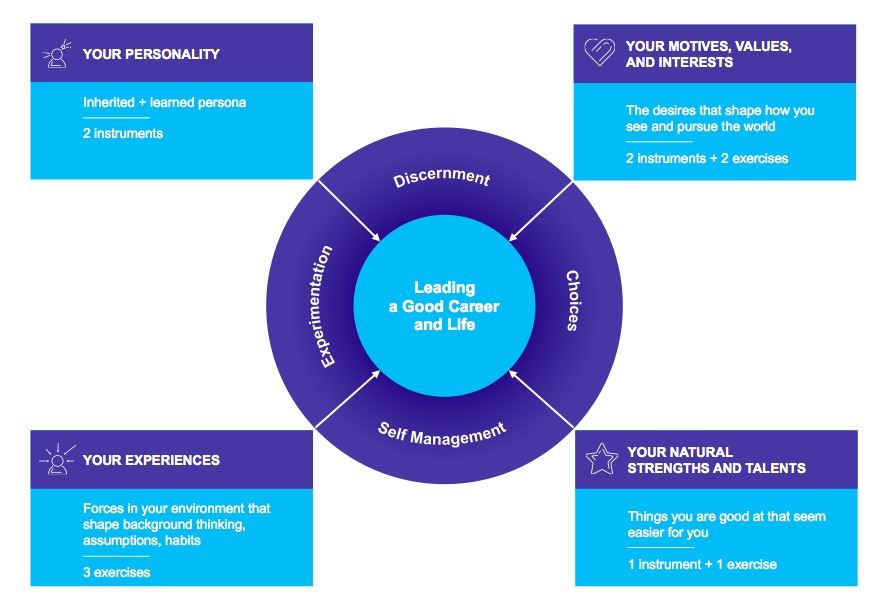DiscernU Method
Our process culminates in the creation of My Mosaic. This is a report that shows you both quantitatively and qualitatively who you are. Your coach will take you through this report and make sure that all of the key insights are drawn out and understood by you.
Our method takes you through a variety of tests and exercises that clarify 5 areas (personality, embedded experiential patterns, motives, values, interests) which collectively enable you to work with one of our coaches to define more clearly your unique persona. All of our tests have been validated and were developed by leaders in the field such as Robert Hogan, John Holland, Martin Seligman and other world class psychologists. In most cases, candidates do this work online and talk with their coaches over the phone or Skype. In some cases, candidates meet as a group in our New York City or Naples Florida offices and do the program over three days as a learning group where their coach facilitates a supportive environment of deep learning and sharing. These groups are set up so that all participants are within the same target group (e.g., executives, students).

The personality report will provide you validated measures that tell you how you differ from others (benchmark data on over 10,000 people) on the following dimensions that are highly relevant to self-management and career.
Adjustment – the degree to which a person appears calm and self-accepting versus self-critical and tense.
Ambition – the degree to which a person seems socially self-confident, competitive versus shy, retiring unconfident and preferring to avoid competition.
Sociability – the degree to which a person seems to need and/or enjoy interacting with others versus being quiet and more withdrawn.
Agreeableness – the degree to which a person is seen as perceptive, tactful and socially sensitive versus unfeeling, impolite and confrontational.
Prudence – the degree to which a person seems conscientious, conforming, and dependable versus irresponsible, nonconforming and impulsive.
Intellectance – the degree to which a person is perceived as bright, creative, and interested in intellectual matters versus having more narrow interests, being practical and enjoying routine.
Other personality insight you will get that will prove helpful in self-management concern comfort with risk taking, ability to tolerate very structured and bureaucratic environments, and your relative need to be passionate about the actual work you do.
A simple way to think about motivation is to say that you will be motivated when you are getting closer to chasing goals and values that you care about. You will be demotivated when that chase is frustrated. So to understand what motivates you requires you to discern what you most want to chase in life. What is most critical is that you understand the relative importance of these desires. Through one instrument and three exercises you will clarify your motive profile and what values are critical to you. For example, you will better understand whether chasing money, relationships, security, achievement, power, status and other values is most important to you.
Exercise 1
Defining your motivating environment
Exercise 2
Defining the environments that will demotivate you
Exercise 3
Rank ordering a list of values
Instrument
A validated instrument that will tell you your percentile score versus a population of 10,000 people what your rank is for a list of 10 fundamental values such as money, security, status, power and others
It is not just our inherited brain chemistry and personality that shape us. Certain deeply held experiences in our lives shape our worldviews and even our background thinking. For example, a woman in one of our executive programs described how her mother when she was about 9 years old, demanded that the coach of the boys soccer team let her daughter try out. The day of tryouts, she dropped her off and left. This woman’s biggest challenge was that she had deeply embedded background thinking that said – “you are on you own.” Her biggest challenge in managing was that she was too independent and did not know how to ask for help or be dependent on others.
You will do an exercise that helps you bring to your conscious mind your embedded tapes and background thinking. They are a part of who you are and how you think and behave. Making them conscious enables you to use them if they help and change them if they are not helpful.
Bright and motivated people can excel in many jobs and earn a good living but, for a career to be fully satisfying, it must match what interests you. A student came to my office and told me that she was getting promoted in her job and was making great money and she worked for a very prestigious company. By many measures she was a great success. The problem was that she was unhappy. As we talked it became clear that she was winning at a game she did not enjoy playing and did not want to play. Her personal interests and her motive profile were not a good match for the job she was in. We were able to help her excel in a job that she was both good at and enjoyed!
You will get a 10 page report that measures your interests based on a validated instrument that measures measures six broad interest patterns that can be used to describe your work personality. You will also see how your relative interests match people who are currently working in various types of careers.
Using the instruments and exercises, you will develop your My Mosaic report that discerns you – “to recognize or identify as separate and distinct”…”to come to know or recognize”…”to see or understand the difference.” Using this report you will work with your coach to unpack the many implications that this self-awareness has for your work, how to leverage your strengths and how to manage yourself to make the most of your career and life.
